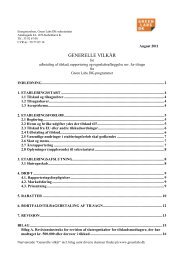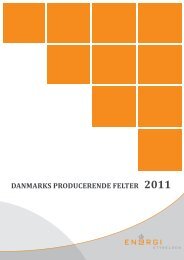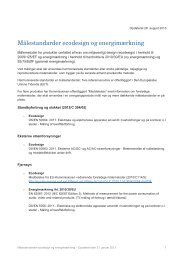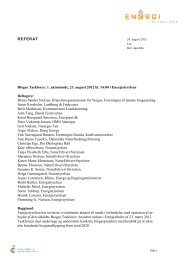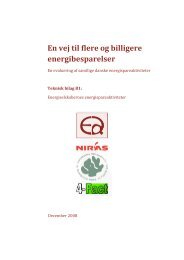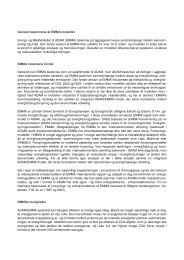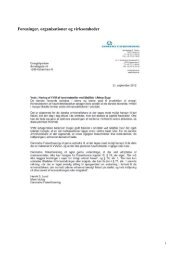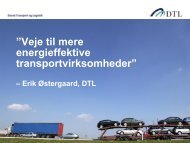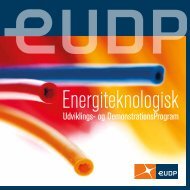Energy Strategy 2050 – from coal, oil and gas
Energy Strategy 2050 – from coal, oil and gas
Energy Strategy 2050 – from coal, oil and gas
Create successful ePaper yourself
Turn your PDF publications into a flip-book with our unique Google optimized e-Paper software.
A stable energy costs framework for<br />
Danish households<br />
The government’s new energy policy initiatives, <strong>and</strong> the<br />
financing of these, affect households in two ways. Firstly,<br />
energy saving efforts will be enhanced <strong>and</strong> there are<br />
a number of initiatives to promote conversion; initially<br />
away <strong>from</strong> <strong>oil</strong>, <strong>and</strong> later away <strong>from</strong> natural <strong>gas</strong>. This will<br />
require investment, but it will also reduce heating costs.<br />
Secondly, households will have to contribute to financing<br />
the green transition through slightly higher electricity <strong>and</strong><br />
heating bills.<br />
Under all circumstances energy costs will increase as a<br />
result of amongst others the growth in <strong>oil</strong> prices on the<br />
world market. However, the new initiatives in the strategy<br />
mean that households will have to pay slightly more for<br />
the energy they use because of the gradually increasing<br />
taxes on energy for heating, gradually increasing PSO<br />
costs for renewable energy as well as gradually increasing<br />
grid tariffs as a result of enhanced savings efforts.<br />
The government’s strategy has been planned so as to<br />
ensure that households’ total bills for electricity, heating<br />
<strong>and</strong> transport develop reasonably over the next few<br />
years. Increases in taxes <strong>and</strong> tariffs will be gradual. This<br />
means, that households will be able to react, for example<br />
by fitting additional insulation, replacing windows,<br />
converting to other types of heating or by buying more<br />
energy-efficient appliances when they need replacing.<br />
Costs of households for<br />
heating <strong>and</strong> electricity<br />
Considered in isolation, households’ expenditure on<br />
heating will increase, although modestly, as a result of<br />
the gradual phase-in of the security of supply tax on<br />
fuel for heating. By far the majority of households will<br />
have several options to maintain their heating bill at an<br />
unchanged level, <strong>and</strong> in some cases even reduce it; with<br />
the additional benefit of simultaneously reducing consumption<br />
of fossil fuels.<br />
By far the majority of households will have<br />
several options to maintain their heating bill<br />
at an unchanged level<br />
All else being equal, a detached house heated by <strong>oil</strong>,<br />
natural <strong>gas</strong> or district heating based on CHP will have<br />
increased heating costs in 2020 of approximately DKK<br />
900, corresponding to 4-5% compared with the current<br />
cost. Similarly, all else being equal, houses heated<br />
by wood pellets will have almost double the increase,<br />
although this will still be a financially attractive type of<br />
heating.<br />
<strong>Energy</strong> consumption for heating could in many cases be<br />
reduced cost effectively in connection with renovation,<br />
replacement <strong>and</strong> purchase of new equipment. Enhanced<br />
efforts to promote energy savings are therefore expected<br />
to result in the average household using 5% less energy<br />
for heating in 2020 than it would otherwise have done.<br />
At the same time, worn out <strong>oil</strong> furnaces can be replaced<br />
with heat pumps, <strong>and</strong> this reduces heating bills<br />
considerably more than replacement with a new <strong>oil</strong><br />
furnace. Natural <strong>gas</strong> installations will also benefit <strong>from</strong><br />
replacement with heat pumps in many cases. In smaller<br />
district heating areas, introduction of free choice of fuel<br />
provides an opportunity to convert to biomass-based<br />
district heating, <strong>and</strong> this can reduce the price of heating<br />
because of lower taxation on biomass. In large district<br />
heating areas, amended regulation can reduce the price<br />
of heating because there is an incentive to increase the<br />
use of biomass, in that producers <strong>and</strong> buyers obtain<br />
freedom of contract in setting the price of heating, <strong>and</strong><br />
thereby share the advantages of lower taxes when using<br />
biomass.<br />
In 2020, the strategy will lead to an increase in the price<br />
of electricity of approximately DKK 0.06 per kWh, including<br />
VAT, corresponding to an increase of approximately<br />
3% compared with an expected price of electricity in<br />
2020 of approximately DKK 2.15 per kWh, including<br />
taxes. For an average detached house with an annual<br />
electricity consumption of 4,000kWh, this corresponds<br />
to additional costs of DKK 250 including VAT per year in<br />
2020.<br />
<strong>Energy</strong> <strong>Strategy</strong> <strong>2050</strong> <strong>–</strong> <strong>from</strong> <strong>coal</strong>, <strong>oil</strong> <strong>and</strong> <strong>gas</strong> to green energy.<br />
63



